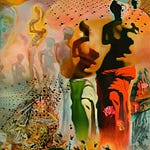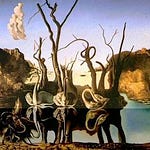Listen to a version of this column on the Poetry in Eden podcast, episode #43, available on Spotify or Apple podcasts.
Poetry in Eden is a full-length audiobook on Spotify, Audible; an e-book and paperback on Amazon, Barnes & Noble; a podcast with guest interviews on Spotify, Apple; and this newsletter.
Find them all at www.feliciaiyamu.com
The content varies, but the mission I write under is the consistent thread.
What if I told you that time moves backwards?
That the future we are striving for already lies in the past. That the past is more vast than the future, full of memories, while the future disappears immediately into the past and its vastness.
What if I told you that our very concept of time has been shaped by Western and capitalist efforts at commodification? That the rush, the grind—these are all means to an end. An inevitable end, beyond which there is no time at all.
What if I told you that we can create as much time as we need, right here in this moment, and that we can cherish it and use it wisely? That by focusing on our family, our health, and our real commitments we will not steal time away from ourselves. That by understanding every single moment is unique within the vastness of time and at the same time insignificant.
That by interacting with time, rather than fighting against it, we can experience more of it and bask in its vastness.
Time. . .time is on our side, if we let it.
Many East African countries view time differently than the west.
In many traditional Bantu philosophical frameworks, Zamani represents the endless, ancestral past, even beyond living memory. It isn't just “history.” It's a deep, living repository of all events, myths, and ancestral presence.
The zamani is overflowing with activity, memory, myth, and ancestral influence. According to John Mbiti, this concept forms part of a dual time framework along with sasa (the present and immediate future/past).
Events "move" from sasa into zamani, becoming part of a vast, timeless past.
Mbiti describes it as "the final storehouse for all phenomena and events" and "the ocean of time into which everything becomes absorbed."
In many indigenous practices, a year is not measured by 365 days, but by the passing of two rainy seasons and two dry seasons.
So, what of the time constructs we live within? Yes, many of them are ancient and help us navigate, produce, and travel through time. But, do they help us ground, thrive, and interact with the eternal?
Finally, what if I told you the date of your last day on this earth? Would you want to know it? What would change today if you did?
THE CAVERN OF TIME AND MEMORY
One foot behind the other, I find the metal hook attached to the boat. I take one last breath before dropping under the sea where I see a hole in the sand. There on the edge, bubbles rising to the surface, I sway and stand, looking down. With a flick of my feet, I turn upside-down to dive straight into the cavern of time and memory.
It is funny to me that this moment found me basking in the sunshine on dry land. The hand of life guided me gently and then I found myself wandering into the captain of a boat called CHANCE. With an unwavering stare, he said, “Girl, this is no happenstance. If you end up here, you must go under and remember it all.” He was tall and calm. I nodded my head and felt my eyes fall towards the trees.
I am not sorry this story is back and forth, and not linear. Actually, this place I’m in, it’s sort of familiar. Well, all I can say is I am on the other side of time. And I promise you, over here, everything is great and I feel happy, and peaceful, and the people are kind. All it took was one last breath, one dive in, and a long swim towards the light.
If you meet CHANCE and the tall man, do not fight it. Your journey often begins when you don’t want it.











